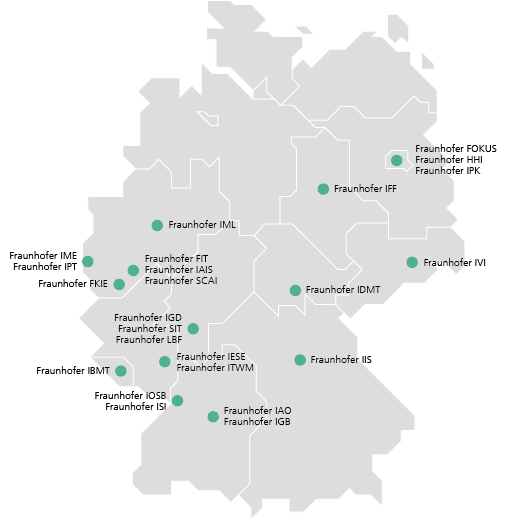Fraunhofer establishes new Big Data Alliance

24 Fraunhofer Institutes have come together to pool their expertise in the new Big Data Alliance, creating a single point of contact for companies, politicians and researchers. © Fraunhofer Alliance Big Data
There were some two sextillion bytes of data stored worldwide last year. Being able to efficiently analyze and structure the ubiquitous flood of data allows us to improve the quality of information and business processes.
Companies can develop new ideas and business models. Taking the example of Industry 4.0, smart sensors in manufacturing equipment can help in the early detection of potential stoppages and in automated error analysis. Big Data offers a host of benefits for almost any sector.
“But it’s incredibly important to combine the required IT expertise with sector-specific knowledge. In surveys, companies report that this is a major barrier for them,” says Prof. Stefan Wrobel, head of the new alliance and the Fraunhofer Institute for Intelligent Analysis and Information Systems IAIS. “This was one reason why we wanted to pool the Big Data expertise of several Fraunhofer Institutes. We want to pursue a comprehensive approach.”
The alliance is organized into clusters that line up with markets and customer groups: Life Sciences, Production, Logistics, Energy and Environment, Security, and Financial and Insurance. Each member institute has experts in all key sectors who bring the necessary specialist knowledge and Big Data experience to the table.
Dovetailing this practical knowledge with international research activities means that the scientists are always in a position to relay the latest findings and methods to the customer. Data protection and security are also important parts of any project and feature among the alliance’s competences.
Implementing major projects
By pooling wide-ranging capacities, the alliance can carry even giant projects – independently and for any service provider. What’s more, the alliance gives companies a chance to collaborate strategically. Member institutes help companies build expertise and work up solutions that can then be applied to traditional business processes, production and logistics, and also to research and product development.
This is based on collective preliminary research, participation in international research programs, regular market studies and sector workshops as well as on utilizing a shared, high-performance IT infrastructure.
Transferring knowledge
Another focal point is the training and advancement of “data scientists.” By offering a comprehensive training concept, the alliance enables Big Data newcomers as well as experts and managers to gather the experience they need. The training on offer ranges from Big Data management and implementation into technical systems and architectures, to further training in specific Big Data application areas such as text analytics. And there are even more training modules for various sectors and business areas in the pipeline. Also planned are certifications and training opportunities through the Fraunhofer Academy.
Further information
Dr. Dirk Hecker
Fraunhofer Alliance Big Data
Schloss Birlinghoven
53757 Sankt Augustin
phone +49 2241 14-1509
dirk.hecker(at)iais.fraunhofer.de
http://www.bigdata.fraunhofer.de Website of the Fraunhofer Alliance Big Data (in German)
Media Contact
All latest news from the category: CeBIT 2014
Newest articles

Silicon Carbide Innovation Alliance to drive industrial-scale semiconductor work
Known for its ability to withstand extreme environments and high voltages, silicon carbide (SiC) is a semiconducting material made up of silicon and carbon atoms arranged into crystals that is…

New SPECT/CT technique shows impressive biomarker identification
…offers increased access for prostate cancer patients. A novel SPECT/CT acquisition method can accurately detect radiopharmaceutical biodistribution in a convenient manner for prostate cancer patients, opening the door for more…

How 3D printers can give robots a soft touch
Soft skin coverings and touch sensors have emerged as a promising feature for robots that are both safer and more intuitive for human interaction, but they are expensive and difficult…



















